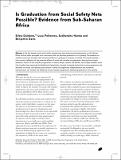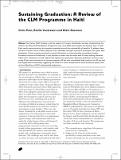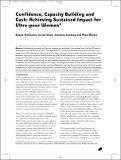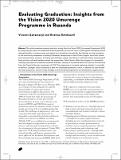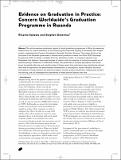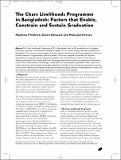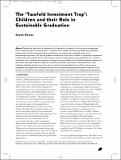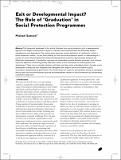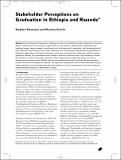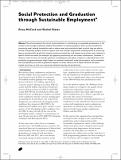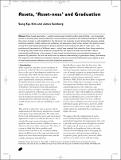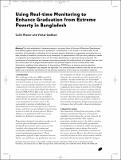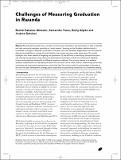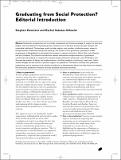Volume 46. Issue 2: Graduating from Social Protection
Browse by
Recent Submissions
-
Is Graduation from Social Safety Nets Possible? Evidence from Sub?Saharan Africa
(© 2015 Institute of Development Studies, March 2015)In the last decade social cash transfer programmes have become extremely popular in sub?Saharan Africa, and are often portrayed as an instrument that can facilitate graduation out of poverty. The evidence on whether social ... -
Sustaining Graduation: A Review of the CLM Programme in Haiti
(© 2015 Institute of Development Studies, March 2015)The Haitian NGO Fonkoze, with the support of Concern Worldwide, has been implementing the Chemin Lavi Miyo (CLM) Graduation Programme since June 2007 which targets the extreme poor in Haiti. Early results were promising, ... -
Confidence, Capacity Building and Cash: Achieving Sustained Impact for Ultra-poor Women
(© 2015 Institute of Development Studies, March 2015)Understanding poverty and how to measure and eradicate it has evolved over the last 20 years to incorporate a multidimensional focus. The experience of Women for Women International (WfWI), a US-based non-profit organisation ... -
Evaluating Graduation: Insights from the Vision 2020 Umurenge Programme in Rwanda
(© 2015 Institute of Development Studies, March 2015)This article examines poverty reduction arising from the Vision 2020 Umurenge Programme (VUP) by comparing the status of households receiving benefits for the first time in 2014 against households which received benefits ... -
Evidence on Graduation in Practice: Concern Worldwide's Graduation Programme in Rwanda
(© 2015 Institute of Development Studies, March 2015)This article examines graduation impacts of social protection programmes in Africa, by presenting evidence from an interim evaluation of the ‘Enhancing the Productive Capacity of Extremely Poor People’ project, implemented ... -
The Chars Livelihoods Programme in Bangladesh: Factors that Enable, Constrain and Sustain Graduation
(© 2015 Institute of Development Studies, March 2015)The Chars Livelihoods Programme (CLP) in Bangladesh aims to lift households out of extreme poverty by providing a comprehensive package of support. As with other poverty reduction programmes in Bangladesh, CLP's success ... -
The ‘Twofold Investment Trap’: Children and their Role in Sustainable Graduation
(© 2015 Institute of Development Studies, March 2015)Despite the overall aim of graduation to lift people out of poverty in the long term, programmes remain largely focused on achieving short? to medium?term change. This article postulates that graduation programmes should ... -
Glossary
(© 2015 Institute of Development Studies, March 2015) -
Exit or Developmental Impact? The Role of ‘Graduation’ in Social Protection Programmes
(© 2015 Institute of Development Studies, March 2015)The framework developed in this article illustrates how social protection with a developmental approach can deepen socioeconomic impact at individual and household level and effectively address apprehension over dependency. ... -
Stakeholder Perceptions on Graduation in Ethiopia and Rwanda
(© 2015 Institute of Development Studies, March 2015)The Food Security Programme in Ethiopia and the Vision 2020 Umurenge Programme in Rwanda deliver a combination of consumption support (cash or food transfers, Public Works employment) and livelihood support (asset packages, ... -
Social Protection and Graduation through Sustainable Employment
(© 2015 Institute of Development Studies, March 2015)This article explores the role of social protection in contributing to sustainable employment in the context of the broader graduation debate. Many efforts to achieve graduation focus on the household or community level: ... -
Assets, ‘Asset?ness’ and Graduation
(© 2015 Institute of Development Studies, March 2015)Asset?based approaches – usually involving asset transfers and/or asset building – are increasingly central to thinking about poverty alleviation, social protection, graduation and livelihood resilience. Although the notion ... -
Using Real?time Monitoring to Enhance Graduation from Extreme Poverty in Bangladesh
(© 2015 Institute of Development Studies, March 2015)The total eradication of extreme poverty is a primary focus of the post?Millennium Development Goal (MDG) agenda. Whilst the term ‘graduation’ is contentious, in this article it is used to refer to the transition of ... -
Challenges of Measuring Graduation in Rwanda
(© 2015 Institute of Development Studies, March 2015)Rwanda demonstrates how a process of community consultation and participation is able to identify and rank community members according to ‘social poverty’, drawing on the Ubudehe tradition which is considered a strength ... -
Graduating from Social Protection? Editorial Introduction
(© 2015 Institute of Development Studies, March 2015)Graduation programmes aim to provide a sequenced and intensive package of support to very poor people, with the objective of facilitating their movement out of extreme poverty towards resilient and sustainable livelihoods. ...

